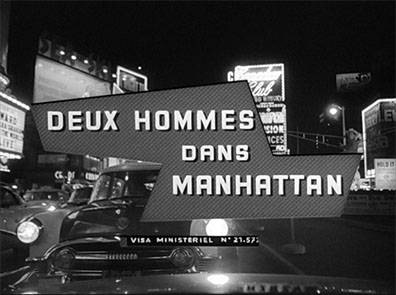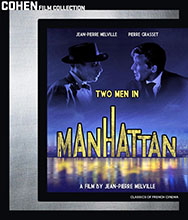
 BUY FROM AMAZON: CLICK HERE!
BUY FROM AMAZON: CLICK HERE!
MSRP $39.98
RATED NR
STUDIO Cohen Media Group
RUNNING TIME 85 minutes
SPECIAL FEATURES
• A Conversation Between Critics
• Booklet Essay
The Pitch
New Wave meets noir on the streets of Manhattan.
The Humans
Jean-Pierre Melville, Pierre Grasset
The Nutshell
A French UN delegate has disappeared into thin air, sending reporter Moreau (Jean-Pierre Melville) and hard drinking photographer Delmas (Pierre Grasset) on an assignment to find him. Their only lead: a picture of three women.
The Lowdown
Cake is not magic. We all know that you can put together the right ratio of starch, sugar, fat, protein, water, leavening, and flavoring. We all know that if you mix (but don’t over-mix) those things, you’ll have a batter that you can bake at a particular temperature for a particular time. At the end of all this work, the likelihood that you’ll have a good cake is pretty high, as long as you followed the recipe. That’s because making delicious cake is all science. Film is another story.

Instructions for anyone who’s shopping for my Christmas present.
I apologize if this comes off as elementary, but we all know that even if you have all the right ingredients and tools to make a film, even if everyone does their job, a film can still come out like a bad cake. Or, more accurately, a team of people can really fuck one or more things up, and this may or may not adversely affect the perceived artistic merit of the film. I’m talking in vague idiot-isms right now because film is damn complicated. Just getting a film financed can feel like a miracle. Imagine what it must feel like to complete one.
On the endless list of things that can get messed up during the making of a film, mood seems like one of the easiest to mess up. Not every critic would agree, of course, but I happen to like films that others might consider moody, so I guess mood is something I take into account pretty heavily when I watch a film. But what is mood, anyway?
Mood is a combination of many ingredients: performance, lighting, music, shot composition, sound effects and foley, editing… these are just a few of the necessary items that filmmakers need in order to synthesize mood. The only trouble with mood is that unlike cake, there’s magic involved. An “X” factor, something intangible. Whatever that magic is, Two Men In Manhattan has it.

I like this guy.
Released in 1959, Two Men In Manhattan is caught between several big eras and genres. It’s an early French New Wave film, but it’s also kind of a late classic-era American noir. Writer/director Jean-Pierre Melville wanted this duality: he modeled the film on classic American urban noir, but there is an inescapable Frenchness about the film. When asked who they are, our protagonists reply “We are French,” because that’s the most important thing about them. The film is not as overtly existential as the rest of the New Wave movement, but there is a European cynicism about American ways that permeates the entire thing.
Melville himself plays our weary gumshoe stand-in, Moreau: a French reporter who looks and dresses an awful lot like Sam Raimi, but with methadone-bender bags under his eyes. Pierre Grasset plays his companion, Delmas: a handsome but sleazy freelance photographer. Together, they seem to be repeating the same scene, over and over: they drive somewhere to meet someone who might know about the whereabouts of the missing UN delegate. Unbeknownst to them, a sinister car follows them. We know it’s a sinister car because it’s accompanied by a sinister music cue. Moreau and Delmas arrive at their intended destination, they dawdle a bit, they find out they need to talk to someone else, and then they drive off again. It would grow tiring if not for the brain-meltingly gorgeous exterior shots of Manhattan, the slinking jazz soundtrack, and the chemistry between the leads.

“This is New York, pal. Walk a block, stand on the curb, put your hand in the air.”
The magic of the film happens through immersion, like when our leads walk into Capitol Records to witness a jazz recording in session. Art Simmons is playing the piano, Glenda Leigh is singing… It’s a lightning-in-a-bottle moment that lasts as long as it should. The only trouble is that the scene doesn’t really add anything plot-wise. It’s just a mood-setter, but the film wouldn’t be the same without it.
These wonderful moments don’t exactly smooth over the awkward scene transitions or the poor overdubbing of several French actresses (who obviously didn’t speak a word of English), but the magic does go a long way; long enough to keep me discovering more great moments. Like when the diner cook grumbles “those Frenchies make me meshuggah!” to a Hasidic customer, or when Delmas is asked to leave his camera at home, only to pull another out of his glove box. “My spare,” he calls it, as if it were a snubnosed .38 special.
While the influences of film noir are apparent in New Wave, it is rare that a New Wave film is ACTUALLY noir. People may argue over whether it’s a genuine member of either category, but the more important point to be arguing is that despite its poor initial reception, Melville’s Two Men In Manhattan is an under-appreciated classic that demonstrates just how magical mood can be.

That moment when you look up and see that some weirdo ordered the beef tongue sandwich.
The Package
As is standard for The Cohen Collection’s remastered films, the transfer on the disc is bloody outstanding. The high contrast exterior shots look exceptionally good, and there’s no sign of print damage or dirt. It’s pristine. I hope I look this good when I’m 55 years old. The 2.0 LCPM audio track, while not particularly showy, is more than adequate.
The booklet in the Blu-Ray case comes with an essay by Ginette Vincendeau, and the only feature on the disc is a conversation between two film critics. If you liked the film, both are worth checking out. I would have loved a commentary or a featurette on the score, but I’m pretty happy with what we’ve got. Put this in a double feature with Le Samouraï and you’ve got yourself a hell of a night.
Rating: 




Out of a Possible 5 Stars